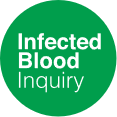 The Infected Blood Inquiry has visited several cities around the country as part of its commitment to bring the Inquiry out of London and hear everyone’s experiences. One year after the terms of reference were agreed by parliament, on the 2nd July 2019, Scotland’s turn came when the Inquiry came to Edinburgh for two weeks.
The Infected Blood Inquiry has visited several cities around the country as part of its commitment to bring the Inquiry out of London and hear everyone’s experiences. One year after the terms of reference were agreed by parliament, on the 2nd July 2019, Scotland’s turn came when the Inquiry came to Edinburgh for two weeks.
There was a feeling of anticipation when the hearings started, people felt relieved it was finally here and unsure about what would be discussed. We had all heard and listened to the incredibly powerful stories from around the country in Belfast, London and Leeds, which were so similar to Scotland. Indeed this testimony continued onto Cardiff’s hearings which took place shortly after Edinburgh. The audience were there to listen, to support the witnesses and each other.
We can never fully appreciate the impact of what has happened to the infected and affected.
From an outsider’s perspective, even looking through the window at the devastation, was as Sir Brian Langstaff described in his closing comments in Leeds, “barely bearable”. Edinburgh was no different. The accounts are all unique but hold common themes that simply cannot be ignored. Frequently, when a witness’s evidence came to an end, in the break, the common words that could be heard through the hall were, “that was what happened to me”. People were emotional and after hearing some of the testimonies, many were left in tears, myself included. The feeling of solidarity was always there and if anything, it grew over the two weeks as the audience returned daily.
People have come out and sat together in a public forum. They have shared and supported each other, which after so many decades of secrecy, can only add to the hopes for the Inquiry. I remember one audience member during the break, singing a song, they wrote. Bravely they stood up and sang out for everyone to hear.
The themes that were discussed but certainly not limited to Edinburgh included:
- Missing medical records
- Stigma
- Long periods between establishing infection and informing the patient
- Lack of consent for testing
- Psychological damage to the infected and affected
People need answers. They need clear answers that aren’t ignored, buried or subject to being whitewashed.
Now, the Inquiry is continuing its investigations until the next hearings in October 2019, where they will be hearing more evidence from core participants. From there, the Inquiry will be hearing evidence in November 2019 from a number of the Inquiry’s expert groups. This will include evidence from the psychosocial group, to consider the impact on the infected and affected, the clinical group on the current knowledge about haemophilia and other bleeding disorders and the clinical group on current clinical knowledge about hepatitis C and HIV, the current and past treatments and their consequences.
It has been a privilege over the last year to meet with many of the people involved and to hear what has happened to them. It certainly leaves a sense of anger and injustice. This is the worst disaster in the NHS history, however it is the least reported. This is one injustice that we hope is being corrected. Now the media and the world are paying attention. The Inquiry is working through a vast amount of data, people are coming together, speaking and sharing and standing together as one. The large number of statements and voices, simply cannot be ignored. People needed to stand up and set out the true impact of what has been done to them. Now they have and they need the answers. People need justice and at Thompsons Solicitors we hope, that this Inquiry will be the one to achieve this.
Blog by Stephanie Spencer.


